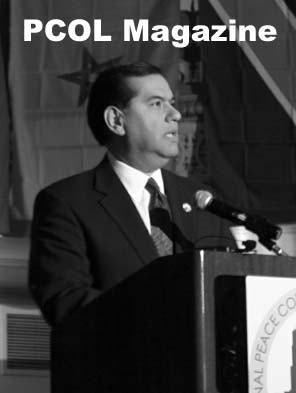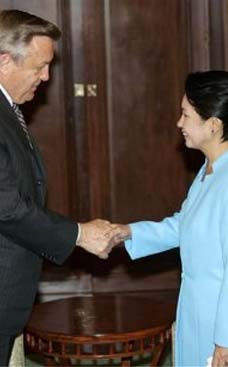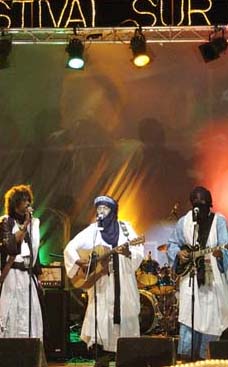
"On Saturday, I will land in Mali where I will take a group of Middle Eastern journalists on a five-day reporting tour. Our delegation has an ambitious itinerary ahead. With stops in the ancient center of learning and trade, Timbuktu, the major port of Mopti on the Niger River, and the capital Bamako, we will explore how partnerships between international organizations and the Government of Mali are helping to reduce poverty and make agriculture more productive. We will also focus on how U.S. humanitarian assistance through the UN Food and Agricultural Agencies helps alleviate malnutrition and hunger in local communities. I am hoping this trip will raise awareness of the very important work that the Rome-based agencies do in addressing crises around the world and in fostering development. The United States is the largest donor to this cause. " Former Peace Corps Director Gaddi H. Vasquez is U.S. ambassador to U.N. food agencies based in Rome.
Gaddi Vasquez posted an online journal of his recent trip to Mali as U.S. representative to the UN Food and Agriculture Agencies in Rome
Ambassador Vasquez - Journey to Mali
Malian farmers introduce Ambassdor Vasquez to millet, a staple cropAmbassador Gaddi Vasquez, the U.S. representative to the UN Food and Agriculture Agencies in Rome traveled through Mali from December 9 to December 15. He also answered questions from around the world and discussed his experiences in Mali as well as U.S. assistance efforts in the region.
As I return home, I would like to share with you a few thoughts about our unique journey to Mali.
I am hopeful for the future success of the work of the UN food and agricultural agencies in supporting Mali's development process for three reasons.
First, partnerships come naturally to the Malian people. I think Americans would be pleased to know that Malians take great pride in working to overcome poverty themselves. At each site visit, I witnessed admirable synergy among the local community, government, UN and NGO partners. The impressive level of collaboration at the grassroots level in Mali could serve as model for other countries in the region.
Second, the Malian Government embraces partnerships through democratic governance. The Malian Food Security Commissioner who traveled with me to the field has great determination and passion for her work. Her leadership helps maintain national political will and openness to participation from civil society, two elements necessary for continued nation-wide strategic planning on food security.
Finally, it is clear to me that the UN Food and Agricultural Agencies are crucial players in building local capacity to alleviate hunger, but more needs to be done. Greater attention must be focused on assuring that sustainability is a major goal of all development projects. Training must be intensified at the local level to continue to empower communities to assess local conditions and to improve health and nutritional education.
It was a pleasure to travel with the five journalists who joined our delegation. Their curiosity and contributions to our meetings and site visits enriched the trip for me and UN representatives. Both they and I return to our jobs with a better understanding of the successes and challenges Mali faces as it continues to build partnerships for poverty reduction through growth. I look forward to reading what they bring back to and share with their local audiences.
Thank you for participating in our educational tour.
Ambassador Vasquez (Saturday Journal) 18 December 2006
from Bamako, Mali
U.S. Ambassador Gaddi Vasquez visits an HIV/AIDS center in Mopti, Mali Saturday, December 16
Our delegation was far from the reach of cell phones most of Wednesday and Thursday. After sharing an early breakfast in Timbuktu of local bread made with one country's staple crops, millet, we traveled by plane to the region around Mopti, affectionately called the "Venice" of Africa.
We took two trips by car to the isolated, rural communities of Gagawomina and Bandiagara. The journalists remarked that these two stops were stark pictures in contrast. In Gagawomina, a village build along the Niger river, locals offered us a basket of fish before giving us a tour of how they have learned the science of water management through an agricultural project supported by FAO food security program.
One of you asked what life is like in Mali. On the rugged, rocky hills of Bandiagara, life is a struggle to coax the land into yielding the nutrients needed by the population to survive. We witnessed the hard work of a group of men and women that receive food from WFP for their efforts to build a dam to bring a more consistent supply of water to their vegetable fields.
Back in Mopti, we visited an HIV/AIDS clinic and counseling center, supported by USAID funding and WFP food aid. I was most profoundly touched by the fact that those living with AIDS have such an important community resource. One patient told me that the center empowers AIDS sufferers by teaching them how to care for themselves, providing meals if they lack family support, and restoring their dignity. The international NGO Population Services International (PSI) educates the local community about AIDS prevention strategies to dispel taboos about the disease.
Thursday we made a seven-hour road trip from Mopti to Bamako. On the way, we toured an FAO farmer field school in Somo where local farmers with IFAD support work to diversify their crops and run micro-credit projects. A local organization manages small loans to farmers and female entrepreneurs with the support of a Peace Corps volunteer aptly named Patience.
We stopped for a quick lunch in Segou where a group of Peace Corps volunteers joined us and shared with the journalists how their engagement with Malians in villages and towns across the country complements the humanitarian assistance of the UN agencies.
We wrapped up our five-day tour of Mali in Bamako on Friday with a press conference. One of the local journalists asked, as did one of the webchat participants, the amount of U.S. contributions to the World Food Program. In 2005, U.S. contributions were $1.22 billion, or 42% of the UN organization's operating budget. 2006 figures through November 2006 put U.S. contributions at $1.046 billion.
President Touré kindly opened the doors to the Presidential Palace to me and the journalists. I took the opportunity to express my admiration for his commitment to advancing the decentralization process, to focusing substantial national resources to food security, and to expanding Mali's agricultural-based economy.
Ambassador Vasquez (Friday Journal) 15 December 2006
from Bamako, Mali
Tuareg women perform a traditional dance It is Friday and we are back in Bamako, which means "place of the crocodile" in Bambara, one of the local languages. We have been traveling for three days through the countryside of Mali. Our tour started Monday in Bamako with the Malian Commissioner for Food Security who set the stage for our visit. She explained the country's intensive plan to maintain food stocks throughout the year.
The journalists and I were curious about how the government in cooperation with UN agencies monitor these stocks. We were pleased to learn that there is a decentralized process in place that empowers 703 local governments or communes to work with local partners to manage their harvests and to help plan for periods of drought. With active collaboration and local ownership, food crises can be averted.
U.S. Ambassador to Mali Terence McCulley gave us an overview of the close bilateral relationship between the United States and Mali. He and his staff explained that to qualify for the recently-signed Millennium Challenge Account Compact, Mali achieved specific benchmarks for growth in its economic, political, and social sectors. Through this Compact, Mali is committed to improving the environment for doing business and effectively managing funds over the next five years.
On Monday, we also participated in an excellent discussion with 24 representatives from NGOs that work on health, education, democracy building, information technology, and agricultural projects in Mali. I was struck by how U.S. assistance has enabled local communities to set up and use private radio stations to strengthen democratic governance and the education system. Mali has 194 private radio stations, all but one created in the past 15 years. NGO reps told us that though the cost of internet access in Mali makes it difficult for rural communities to connect to the web, inventive community radio programs disseminate information found on the internet through call-in talk shows.
Our flight on Tuesday to Timbuktu, Mali’s largest region, brought us to an arid area, spotted with small settlements. Sparse lakes and rivers are the lifeblood of this Sahelian zone. References to water and challenges faced by channeling it into supporting the cultivation of grains and vegetables were ever-present in our discussions with local farmers and community leaders in the villages of Bagadadji and Wana.
In the town of Timbuktu, we walked the path of many generations of Islamic scholars and leaders with the gracious local Imam Ben Essayouti as our guide. He led us through the grand mosque that dates to the 14th century and the adjacent library of Islamic Manuscripts. The document center, once of the site of the largest library in the world, was restored in 2002 with funds from a U.S. Government cultural preservation grant.
Outside of Timbuktu, in Goundam, a group of women showed us how they are making gardens grow through the use of irrigation pumps. One woman proudly announced in an interview filmed by Al Arabiya that she not only tends the gardens, but also fixes the pumps when they break. Representatives on site from a local NGO responded to one of your questions by telling us that AfriqPower, a Malian company, is leading the national effort to harness solar energy with solar panels and to expand the use of solar cooking equipment. When the first solar cookers with parabolic dishes were introduced to the desert regions of Mali, the risks of burns outweighed the benefits of using up limited stocks of firewood. A newer solar cooker that captures rays in a wooden box with a plexiglass cover provides for slower, safer cooking. 30,000 of these cookers are in use and are starting to catch on.
We finished our first of three days in the field with dinner under starry skies on the dunes of Timbuktu with a cultural performance by Tuareg musicians and dancers and a traditional dinner of grilled mutton. The Mauritanian journalists told me that they felt culturally and geographically closer to home in this region.
In my next posting, I will describe our stops in the river port town of Mopti and yesterday's journey by road from Mopti back to Bamako. Today our group will share our experiences and impressions with Malian President Touré and in a press conference with the Malian press. Thank you for all of your interesting questions and comments.
Ambassador Vasquez (Sunday Journal) 10 December 2006
from Bamako, Mali
U.S. Ambassador Gaddi VasquezMy team from the U.S. Mission to the UN Agencies in Rome arrived safely in Bakako late last night. The journalist participating in our tour from Egypt met us on the flight into Bamako from Paris. We received a warm welcome from our Malian hosts. The rest of our international group arrives today and representatives from the FAO and WFP will give us an overview of our travel schedule tonight.
To answer one of your questions about the composition of our delegation, we are traveling with representatives from three Arabic-language dailies: Al Anbaa (Kuwait), Al Akhbar (Egypt), and Al Massae (Morocco). Al Arabiya, pan-Arab satellite news network, sent its Mauritanian stringer for West Africa to join us.
Tomorrow in Bamako our group will attend meetings with Malian Government officials, U.S. diplomats, and NGO leaders. We look forward to productive discussions during which I will ask some of the questions posed by participants in this chat.
Ambassador Vasquez 08 December 2006
from Rome, Italy
U.S. Ambassador Gaddi VasquezOn Saturday, I will land in Mali where I will take a group of Middle Eastern journalists on a five-day reporting tour. Our delegation has an ambitious itinerary ahead. With stops in the ancient center of learning and trade, Timbuktu, the major port of Mopti on the Niger River, and the capital Bamako, we will explore how partnerships between international organizations and the Government of Mali are helping to reduce poverty and make agriculture more productive. We will also focus on how U.S. humanitarian assistance through the UN Food and Agricultural Agencies helps alleviate malnutrition and hunger in local communities. I am hoping this trip will raise awareness of the very important work that the Rome-based agencies do in addressing crises around the world and in fostering development. The United States is the largest donor to this cause.
I selected Mali as the first country to visit during my tenure because it has a strong record of good governance and economic reform. In fact, the President of Mali was just in the U.S. and signed a Millennium Challenge Compact agreement for $461 million to fund poverty reduction projects in Mali. This agreement reflects our strong desire to help the people of Mali in their struggle to make ends meet in a country vulnerable to adverse weather conditions and desertification.
Our journey next week will take us to irrigation projects, school feeding programs, food storage facilities, health clinics, micro-credit projects, and an HIV/AIDS nutrition center, all assisted through partnerships. We will meet with farmers, local entrepreneurs, religious leaders, and government officials in villages and rural communities. I look forward to sharing my impressions with you and welcome your questions and comments as we embark on this tour.
Gaddi Vasquez
U.S. Ambassador to the UN Food and Agriculture Agencies
Rome, Italy



















